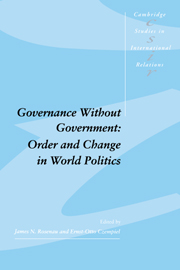Book contents
- Frontmatter
- Contents
- Notes on contributors
- Preface
- 1 Governance, order, and change in world politics
- 2 Governance without government: polyarchy in nineteenth-century European international politics
- 3 The decaying pillars of the Westphalian temple: implications for international order and governance
- 4 The “triumph” of neoclassical economics in the developing world: policy convergence and bases of governance in the international economic order
- 5 Towards a post-hegemonic conceptualization of v/orld order: reflections on the relevancy of Ibn Khaldun
- 6 The effectiveness of international institutions: hard cases and critical variables
- 7 Explaining the regulation of transnational practices: a state-building approach
- 8 “And still it moves!” State interests and social forces in the European Community
- 9 Governance and democratization
- 10 Citizenship in a changing global order
- Index
8 - “And still it moves!” State interests and social forces in the European Community
Published online by Cambridge University Press: 13 October 2009
- Frontmatter
- Contents
- Notes on contributors
- Preface
- 1 Governance, order, and change in world politics
- 2 Governance without government: polyarchy in nineteenth-century European international politics
- 3 The decaying pillars of the Westphalian temple: implications for international order and governance
- 4 The “triumph” of neoclassical economics in the developing world: policy convergence and bases of governance in the international economic order
- 5 Towards a post-hegemonic conceptualization of v/orld order: reflections on the relevancy of Ibn Khaldun
- 6 The effectiveness of international institutions: hard cases and critical variables
- 7 Explaining the regulation of transnational practices: a state-building approach
- 8 “And still it moves!” State interests and social forces in the European Community
- 9 Governance and democratization
- 10 Citizenship in a changing global order
- Index
Summary
Over the last several years, world politics has entered into a period of transition that rivals in depth and scope the changes of the immediate postwar era. These changes intrigue many observers all the more since they materialized from orderly and otherwise unexceptional processes rather than among the convulsive aftershocks of war. Nowhere do the effects of these changes stand out more clearly than in Europe.
Brief years after a United States president reaffirmed the Cold War commitment to combat the Soviet Union's “evil empire,” the bipolar division of the European continent is rapidly disappearing. The strident and divisive themes suffusing Cold War rhetoric find little support in emerging visions of world governance and order. After having spent the last four decades trying to undermine the Soviet Union's position in Eastern Europe, the West now encourages Gorbachev's tenure of power in the interest of European stability, as one-party regimes in Eastern Europe topple to be replaced by more competitive political systems. Suddenly, DeGaulle's ambitious call for a Europe “from the Atlantic to the Urals” is upstaged by the possibility of “a unified Europe stretching from Cork to Kamchatka.” While the dismantling of the Soviet bloc and the uniting of the two Germanies serve as striking symbols of the powerful forces of change sweeping Europe, a more subdued revolution continues in Western Europe centering on the European Community (EC).
The causes and consequences of changes across the continent undoubtedly interconnect on a number of points.
- Type
- Chapter
- Information
- Governance without GovernmentOrder and Change in World Politics, pp. 219 - 249Publisher: Cambridge University PressPrint publication year: 1992
- 11
- Cited by

